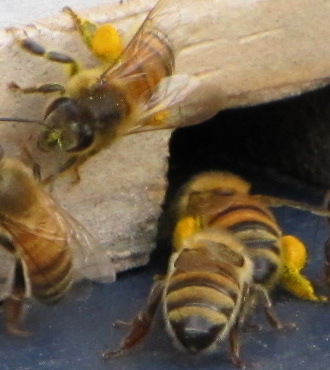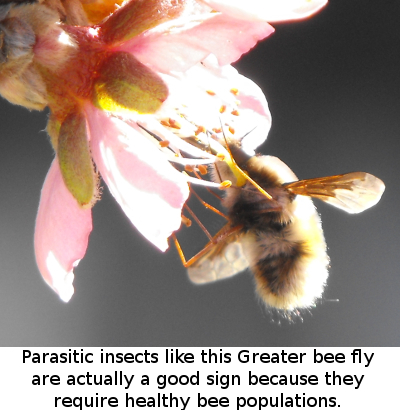
Wild bees are the best pollinators
 Although
Attracting
Native Pollinators
discusses many other types of
pollinators, they recommend that you focus your efforts on making bees
happy. The Xerces Society argues that bees are the most important
group of pollinators because:
Although
Attracting
Native Pollinators
discusses many other types of
pollinators, they recommend that you focus your efforts on making bees
happy. The Xerces Society argues that bees are the most important
group of pollinators because:
- Bees are hairy, which means pollen sticks to their bodies and is carried in large quantities from flower to flower.
- Bees actively gather pollen. Most other types of pollinators focus on nectar, which means they might never even come in contact with the flower's pollen. For example, the long tongue of a butterfly allows the insect to feed without brushing up against the stamens of many flowers. In contrast, since bees use pollen as a source of protein and other nutrients, the insects often end up coated in the grains.
- Bees exhibit flower constancy.
Many bees fixate on a single species of flower at a time, visiting up
to 100 individual flowers of the same type on a single trip. In
contrast, other pollinators usually hop around, starting on an
aster, dropping by some goldenrod, and ending up on a dandelion.
This generalist
strategy works well for the insects but means the flowers are wasting
lots of pollen that will end up on another type of plant and won't do
its job.
 It's
worth noting that when I say "bees" this week, I'm not really talking
about honeybees. Although large agricultural operations tend to
put all their eggs in one basket and focus on the introduced honeybee,
some farmers have found that providing habitat for native bees (more on
that in later posts) results in better pollination efficiency than
trucking in migratory honeybee hives. In addition, scientists
have discovered that adding honeybees to the mix actually decreases the
populations of native pollinators, which results in problems down the
line when the honeybee
hives collapse or
when picky plants have to do without the only pollinator species
they're equiped to deal with.
It's
worth noting that when I say "bees" this week, I'm not really talking
about honeybees. Although large agricultural operations tend to
put all their eggs in one basket and focus on the introduced honeybee,
some farmers have found that providing habitat for native bees (more on
that in later posts) results in better pollination efficiency than
trucking in migratory honeybee hives. In addition, scientists
have discovered that adding honeybees to the mix actually decreases the
populations of native pollinators, which results in problems down the
line when the honeybee
hives collapse or
when picky plants have to do without the only pollinator species
they're equiped to deal with.
In general, our gardens
and natural ecosystems fare much better when we attract as wide a
variety of native pollinator species as possible. The Xerces
society posits that if we focus on helping native bees, we'll also
protect the other pollinator groups --- wasps, flies, butterflies,
moths, and
beetles. The result is not only pollinated plants but also
control of pest insects and the production of nest sites for
bees. Stay tuned for more information on how to make this
diverse pollinator population a reality in your neck of the woods.
| This post is part of our Attracting Native Pollinators lunchtime
series.
Read all of the entries: |
Want more in-depth information? Browse through our books.
Or explore more posts by date or by subject.
About us: Anna Hess and Mark Hamilton spent over a decade living self-sufficiently in the mountains of Virginia before moving north to start over from scratch in the foothills of Ohio. They've experimented with permaculture, no-till gardening, trailersteading, home-based microbusinesses and much more, writing about their adventures in both blogs and books.
Want to be notified when new comments are posted on this page? Click on the RSS button after you add a comment to subscribe to the comment feed, or simply check the box beside "email replies to me" while writing your comment.
